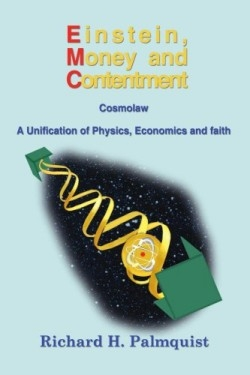Einstein, Money and Contentment
Cosmolaw: A Unification of Physics, Economics and Faith
At its very opening, this book relates God the Father to the structure of natural law, God the Son to its essence, and God the Holy Spirit to its dynamic. Thus does author Palmquist offer his views of how to live, produce prosperity, and be content — all according to the laws of electricity, which he says transmute into any situation, becoming what he calls Cosmolaw. Palmquist also asserts that the common man’s efforts to be prosperous and content are all made difficult, if not impossible, by current government and economic structures.
Palmquist, a broadcaster and publisher and the founder of Family Stations, Inc., begins with a detailed discussion of the laws of electricity — laws, he says, that can be applied to everything from religion to economics to politics for an explanation of how things work. Through this laborious and sometimes hard-to-understand framework, he cites numerous examples — everything from how the universe itself works, to the treatment of money in society and the functioning of economics, from taxes and justice, to relationships and the practice of religion. Many readers will find it difficult to relate Cosmolaw, to his assertions, or follow the connections he draws between them.
However, much of what Palmquist says will ring true for readers. For instance, his statement, “Money is taxed at the point where money is created under our present system. There is no need for individual income tax, except for Congress’ desire to exert social control over the populace” will certainly attract some followers. He offers numerous criticisms of the way in which economics functions, offering plenty of grist for discussion, and his assertions that worship services should be based on thanksgiving and celebration of success rather than focused on sin and its history will also find adherents.
Palmquist speaks up for individual liberties, criticizing government’s efforts to over-regulate, yet recognizing a need for some regulation. He also relates how relationships fit into Cosmolaw, citing examples of “the right kind of ambitious greed” that helps to benefit everyone, and acknowledging the need for ambition to be tempered. He also applies Cosmolaw to religion, and pointing to the conversion of Leopold Weiss, who “left a Christian society as a Jew” and became a Muslim, not only because of the influence of the Koran but also because of the behavior patterns of those around him. He states, “Our habits can affect the lives of others.”
Exhorting readers to follow his Cosmolaw to transform their lives and financial situations into contentment and economic well-being, Palmquist prods and pushes the reader throughout the book, ending with instructions to “leftist-liberal[s]” to “stay out of government” and help their neighbors, and to “rightist-conservative[s]” to “run for office” and work to “humble … government employees who … view themselves as imperial rulers.” Readers dissatisfied with the state of the world will find plenty to contemplate, whether they follow Cosmolaw or not.
Reviewed by
Marlene Satter
Disclosure: This article is not an endorsement, but a review. The publisher of this book provided free copies of the book and paid a small fee to have their book reviewed by a professional reviewer. Foreword Reviews and Clarion Reviews make no guarantee that the publisher will receive a positive review. Foreword Magazine, Inc. is disclosing this in accordance with the Federal Trade Commission’s 16 CFR, Part 255.

